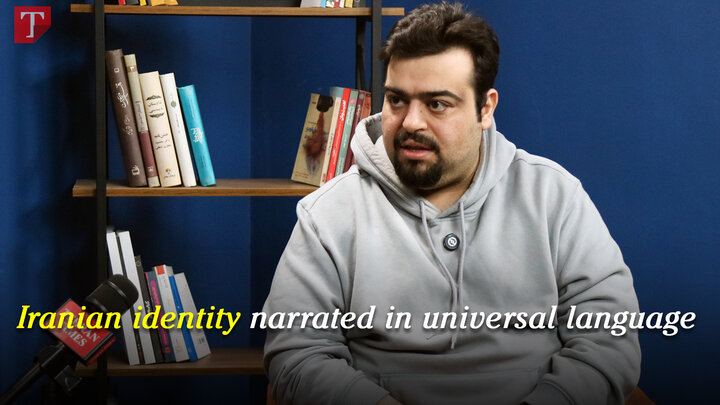-
 2026-01-21 21:01
2026-01-21 21:01
From ‘dirty work’ to ‘great things’: How Europe became America’s lackey
By Saleh Abidi Maleki
TEHRAN – “Do you still believe that by helping the United States commit its crimes we will be safe?” Irene Montero, Spain’s representative in the European Parliament, asked her colleagues this week. It was not a rhetorical flourish so much as an indictment.
-

3,117 people were killed in recent riots in Iran: official announcement
TEHRAN – The Legal Medicine Organization released a report on Wednesday evening announcing that 3,117 people were killed in the recent violent protests in Iran.
-

By Xavier Villar
Beyond Trump: The structural roots of the conflict with Iran
MADRID - Across much of the coverage of the latest escalation between the United States and Iran, a reassuringly simple explanation has taken hold. The problem, it is suggested, has a proper name. Donald J. Trump, with his confrontational style, his contempt for multilateral agreements and his preference for displays of force, is portrayed as the primary figure responsible for pushing the bilateral relationship to the edge of the abyss.
-

The legal accountability of a brazen interference: US must be held accountable
By Seyyed Abbas Araghchi, Iranian Foreign Minister
Recent organized terrorist operations carried out in line with and following the imposed 12-Day war against the Islamic Republic of Iran have once again revealed the true nature of the United States' behavior toward Iran. However, beyond this, a fundamental question arises in the realm of international relations: Can governments continue to openly interfere in the internal affairs of other countries without paying a price?
-

By Fatemeh Kavand
A Pahlavi souvenir in the final clash inside the Western think tank
TEHRAN - The main project of the expatriates and the Western–Hebrew think tank behind the recent unrest in Iran, from its very beginning on Dey 18 (January 8), was not merely to create disorder and insecurity, but rather to wait for feedback on the level of violence and to increase the number of casualties.
-

By staff writer
Fox in the henhouse: Trump’s ‘Board of Peace’ lets Bibi off the leash
TEHRAN — The decision to include Prime Minister Benjamin Netanyahu on a so-called U.S.-led “Board of Peace” for Gaza highlights the deep incoherence of Washington’s approach to Israel’s war against the enclave and its aftermath.
Politics
-

People’s demands should be addressed: Pezeshkian
TEHRAN - Iranian President Masoud Pezeshkian has called on the country’s Supreme National Security Council to work out proper methods to prioritize and address people’s demands and protests.
-

Armed forces in high spirits and quite ready to defend Iran: IRGC deputy chief
TEHRAN – Iran's armed forces are prepared for any confrontation following military threats by the United States, Ahmad Vahidi, deputy head of the Islamic Revolutionary Guard Corps, has said.
-

US treasury chief admits sanctions intended to fuel unrest in Iran
TEHRAN – U.S. Treasury Secretary Scott Bessent has openly acknowledged the role of American sanctions in destabilizing Iran’s economy and fueling public unrest, describing the sanctions as a form of “economic statecraft” that had contributed to recent riots in Iran.
Sports
-

Iran’s Faraji wins WTT Youth Contender Doha 2026
TEHRAN – Benyamin Faraji of Iran won the title at the WTT Youth Contender Doha 2026 on Tuesday.
-

Persepolis reach agreement with Dániel Gera: report
TEHRAN – Iran’s Persepolis football club have reportedly reached an agreement with Hungarian winger Dániel Gera.
-

Korean defender Lee Ki-Je joins Mes Rafsanjan
TEHRAN – Korean defender Lee Ki-Je has joined Mes Rafsanjan on a contract through the end of the season.
Culture
-

Iranian concerned visual artists create works regarding recent unrest
TEHRAN – Iranian visual artists have created artworks regarding the recent unrest in the country, which started with protests over currency market volatility among Iran’s bazaaris, but the peaceful demonstrations were exploited by the U.S. and Israel and, supported by the foreign regimes, devolved into systemic urban terrorism in an effort to overthrow the Islamic Republic.
-

Iranian cultural, media leaders reaffirm national unity
TEHRAN- A broad coalition of prominent cultural and media figures in Iran issued a statement on Wednesday, denouncing U.S. interference in Iran's internal affairs and calling for national unity.
-

Veteran actor, singer Reza Rooygari passes away
TEHRAN – Veteran Iranian actor, singer Reza Rooygari died of a heart attack at the age of 75 in Tehran on Wednesday.
Economy
-

POGC rises gas extraction from South Pars phase 11
TEHRAN - The project manager of South Pars phase 11 at Pars Oil and Gas Company (POGC) said daily gas extraction from the block has increased by more than two million cubic meters with the completion and commissioning of the 10th development well.
-

IGTC amps up readiness for stable gas supply through winter
TEHRAN - The head of Iranian Gas Transmission Company (IGTC) announced the company's winter preparations to ensure safe and stable passage through the peak gas consumption days in the winter of 1404, stating: "Approximately 207 billion cubic meters of gas has been transferred to consumer endpoints in the first nine months of this [Iranian] year (March 21-December 21, 2025)."
-

Over 2,000 production units introduced to receive working capital
TEHRAN- The spokesperson of the Ministry of Industry, Mining, and Trade announced the submission of the first list of production units eligible to receive facilities to the Central Bank of Iran (CBI) and said this list includes 2,486 production units.
Society
-

31st scientific Olympiad slated for spring
TEHRAN – The 31st scientific Olympiad for university students is scheduled to be held on April 17.
-

National document on advanced material science, technology unveiled
TEHRAN – The national document for the development of advanced material science and technology was unveiled on Tuesday.
-

99 earthquakes hit Iran in a week
TEHRAN – A total of 99 earthquakes were recorded across the country in a week from January 10 to 16, according to the seismological networks of the Institute of Geophysics of the University of Tehran.
Tourism
-

Water leaks, ground subsidence raise concerns at Isfahan’s UNESCO-listed mosque
TEHRAN - Iranian authorities and heritage experts are racing to contain what they describe as a structural threat to parts of the UNESCO-registered Jameh Mosque of Isfahan, also known as the Atiq Mosque, after a limited ground subsidence, water leakage and rising moisture were detected around one of the world’s most important Islamic monuments.
-

19th-century sarays in Rasht bazaar damaged in unrest
TEHRAN - Three 19th-centry sarays dating back to Qajar period have been damaged after a fire broke out at the historical bazaar in northern Iran during unrest last week, officials said.
-

Mashhad combines pilgrimage with tourism and urban infrastructure
TEHRAN - Mashhad, the capital of Khorasan Razavi province, is one of Iran’s main domestic travel destinations, drawing millions of visitors each year for religious, cultural and leisure purposes.
International
-

Fox in the henhouse: Trump’s ‘Board of Peace’ lets Bibi off the leash
TEHRAN — The decision to include Prime Minister Benjamin Netanyahu on a so-called U.S.-led “Board of Peace” for Gaza highlights the deep incoherence of Washington’s approach to Israel’s war against the enclave and its aftermath.
-

Israeli wars deepen domestic anxiety
TEHRAN – Rather than increasing settlers’ sense of security, the Israeli regime’s aggression across the region has had the opposite effect.
-

Trump’s Greenland obsession turns Davos into a test of Europe’s resolve
TEHRAN — President Donald Trump’s appearance at the World Economic Forum in Davos on Wednesday was a display of geopolitical brinkmanship, delivered with the swagger of a leader who treats alliances as leverage rather than partnerships.
Most Viewed
-
10 lies Western media is telling you about the unrest in Iran
-
Stabbed, burned, beheaded, and then sanctioned
-
Why Washington misunderstands power in Iran
-
More US-Israeli ‘sabotage cells’ dismantled across Iran
-
Lavrov says Trump’s remarks against Iran are ‘deeply concerning’
-
Foreign-backed terror cells across Iran crushed: Intelligence Ministry
-
Iran security forces repelled a mob of 200 raiding Palestinian diplomatic residence: report
-
‘We’ll set their world on fire’: Iran's military issues warning over leadership red line
-
Top Iranian officials hail defeat of foreign-backed sedition in joint statement
-
Araghchi blasts Davos billionaires’ club for Zionist surrender
-
GII 2025: Iran ranks 11th among Islamic nations
-
The Gaza ‘Board of Peace’ is Humpty Dumpty diplomacy — assembled for spectacle, not restoration
-
Recent riots the Iranian version of Lebanon pager attacks, says Qalibaf
-
Serbian president’s invocation of a modern Operation Ajax and the 1953 script
-
Davos showdown over Greenland: Europe confronts Trump, faces its costly US reliance












